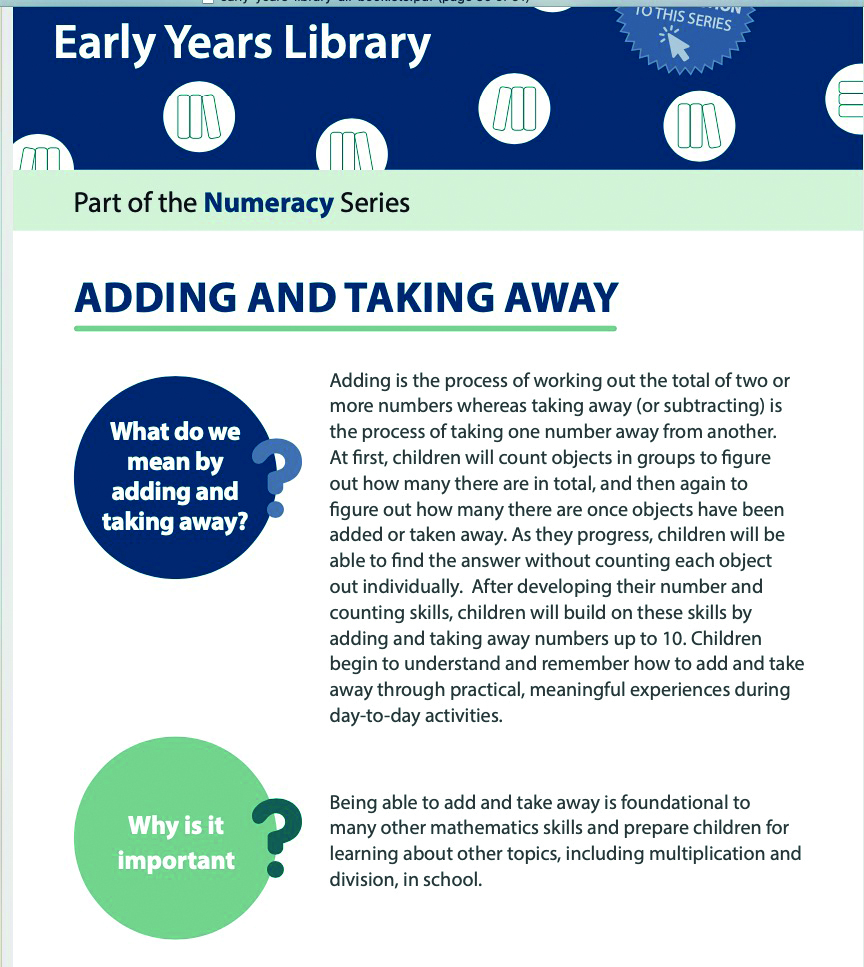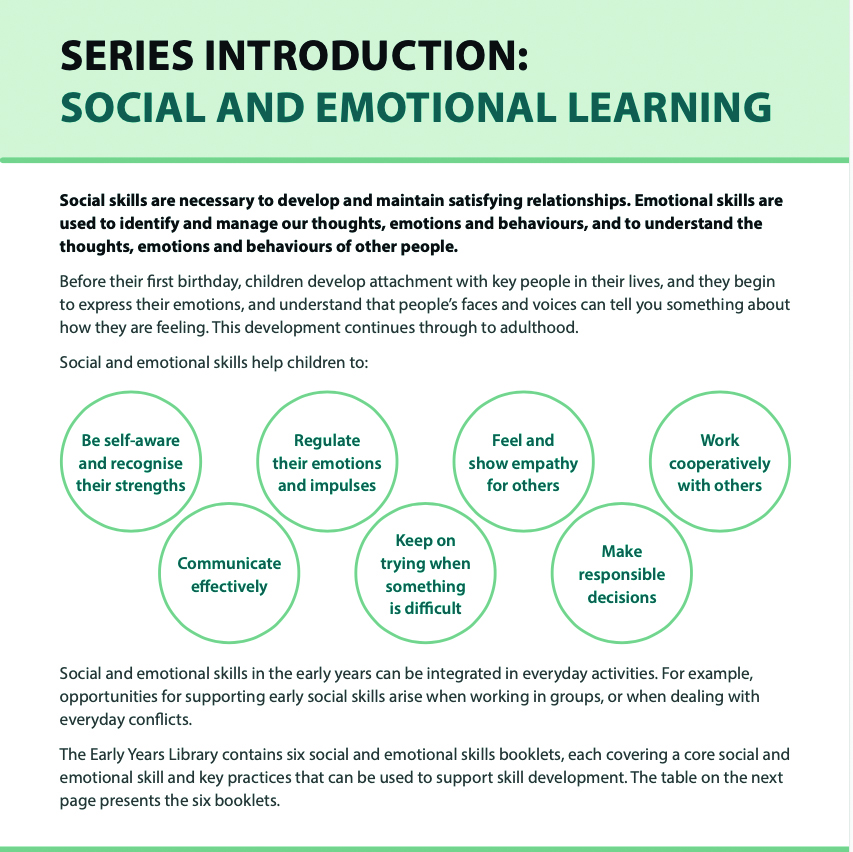
The Early Years Library, a free resource launched in summer 2022, aims to address potential barriers to delivering evidence-based early childhood education.
It includes 14 booklets which concentrate on language and early literacy, early numeracy, and social and emotional skills.
After examining 22 evidence-based early childhood education programmes, the Early Intervention Foundation and the PEDAL centre at the University of Cambridge brought together an expert panel of 15 practitioners to support the development of the resource.
The panel consisted of nursery workers, managers and childminders from maintained and private settings across England and Wales, who met bi-monthly to discuss how the Early Years Library resources could be used to inform different activities such as training and continuing professional development (CPD).
Through interactive online workshops, practitioners were consulted on the tone, language, content and design of the Early Years Library. In between workshops, practitioners piloted the booklets in their setting and provided feedback on feasibility, usability and overall satisfaction.
Chloe Webster, a childminder at Pebbles Childcare, was approached to review the resource. ‘We were sent content to review how it would read from a practitioner's point of view,’ she explains.
‘In the early stages, I took some of the first drafts into work and discussed them with other professionals to see how they would work in practice, because being a home-based childcare provider meant they would work differently for us.’
As a childminder with previous experience of working in nurseries, Webster was able to assess the material from a range of angles. ‘The booklets should be able to be adapted whether you’re working on your own or within a nursery setting. I was able to go back to colleagues and reflect on how we could do it. I reviewed it wearing different hats.’
Format
The panel brought their practical knowledge to development of the resource, helping the developers think about how the library would be used.
Liz Humphreys, nursery manager at Banana Moon in Harbury, was also involved in the panel. ‘They had 80 per cent of it there, we just fine-tuned it,’ she says.
‘I’d look at a page booklet and say, as a practitioner, that would put me off straightaway. All I can see is seven paragraphs of words on the page. There's nothing breaking it up.
‘We suggested using text boxes, with highlighted headings that stood out in the middle of the page.’
‘We added things like “tips and tricks” at the bottom,’ says Webster.
‘We talked about people using them as posters to act as pointers for observation and assessment purposes, or sharing with parents to enable them to support learning and development. We also suggested practitioners might use them as resources for staff training days.’
Language
One of the key challenges was to ensure content was accessible.
‘Because there was such heavy research behind it, it was important to try and ensure that it wasn’t too jargony,’ Webster explains.
‘There is such a diverse range of practitioners in every setting, some that have no academic CPD background, some with degrees. One of the challenges was ensuring the content could reach all of them.’
Humphreys agrees. ‘Everyone has different learning styles. I’ve got apprentices who are dyslexic. I’ve got apprentices who want to go on to do their Master's. I’ve got practitioners who love to read, I’ve got practitioners who love to be hands-on. The toolkit has to fit everybody's learning styles, the same way we do with children.
‘We needed the opening paragraph to draw the practitioner in. It couldn’t start with “research has shown that” or “Professor so and so says”. That's not what practitioners need. They need an opening tagline that makes them want to find out more.’
When approaching numeracy, Webster says it was particularly important to make content easily understood.
‘They went for a more academic approach first. We had some great academics contribute, but then it was about making it accessible enough for those with lower confidence, because across the sector, numeracy in particular is an area where practitioner confidence has an impact on how it is delivered to children. So the toolkit was developed on the basis of trying to advocate that numbers and maths learning can happen anywhere. We collaborated on the language that practitioners can use to make that happen.’
Social and emotional skills
Meanwhile, the toolkit's language, social and emotional skills focus was tweaked to ensure it met the needs of children today.
‘Speech and language support and training can be very samey, especially the ones offered by local authorities,’ explains Webster.
‘We wanted to get across that children's ability to learn is significantly higher once they have developed secure relationships, and put that onus on the practitioner to get to know your children, and be that supportive, knowledgeable “other” for them.
‘There are now a lot of group games, one-to-one tips and support for building confidence included. It helps practitioners go through the process of supporting a child's confidence to encouraging the child in communicating their needs, with a smaller group activity moving on to a larger group activity. In that way, it echoes the natural progression of social development and playing alongside others, ultimately working towards achieving that collaborative play.
‘With the impact of Covid on PSED and speech and language in children at the moment, with so many children that need emotional, speech and language support, the toolkit now really answers that need.’
The resource will also answer staff needs, Webster adds, particularly in the current climate, and all for no cost to the setting.
‘From a CPD point of view, especially post-Covid, no-one has much time or money to invest in anything for their staff. In that sense, the toolkit is very timely and much-needed.’
CASE STUDY: Banana Moon, Harbury

 Nursery manager Liz Humphreys uses the toolkit with early years apprentices.
Nursery manager Liz Humphreys uses the toolkit with early years apprentices.
‘Through peer observation, and the feedback that I get from the assessor, I know which area they need developing in next, so I can cherry-pick sections out of the booklets. During supervisions, I can sit and talk them through it, and then I leave it in staff rooms so staff can access it themselves,’ she says.
She also uses the booklets for staff training. ‘I use the resources to fill gaps and extend and develop knowledge,’ she says. ‘For example, I think maths is always a weak area. Staff practitioners just hear the word “maths” and panic. They think they need to know equations or what an equilateral triangle is. I think these booklets really emphasise that that's not what maths is.’
She says that often, the resource helps build confidence.
‘I’ve had a member of staff come to me and say they were struggling with a child with their emotions. I pulled up the social emotional development booklet, and we worked through it together. We looked at the strategies to see if she had been using them, and asked whether the child was struggling with their emotions because they were struggling with communicating with others.
‘One of the tips is encouraging children to use a brave voice and make themselves big when talking to adults and others. The staff member said she would never have thought of that, but I told her that was something I saw her doing every day. The resource just gave that professional confidence that she was doing it right.’
The individual topics in the booklets allow managers to identify specific areas to target in supporting staff development.
‘If I’ve got a member of staff who's struggling with reading stories, I’ve got an evidence base to show them why we need to read, and why language is so important,’ Humphreys says.
‘But I’ve also got strategies which I can share with them, and can signpost them to specific areas, not just tell them to read pages 5 to 7. I can guide them so that the training is individual learning, rather than just a “one size fits all” approach.’
The setting shares tips from the toolkit with parents and is also planning webinars for families using strategies from the booklets, after parents asked for support in managing children's emotions at home.
Humphreys says, ‘The strategies that we’ve always used aren’t working any more. We are having to look deeper into how we can support these children.’
MORE INFORMATION









